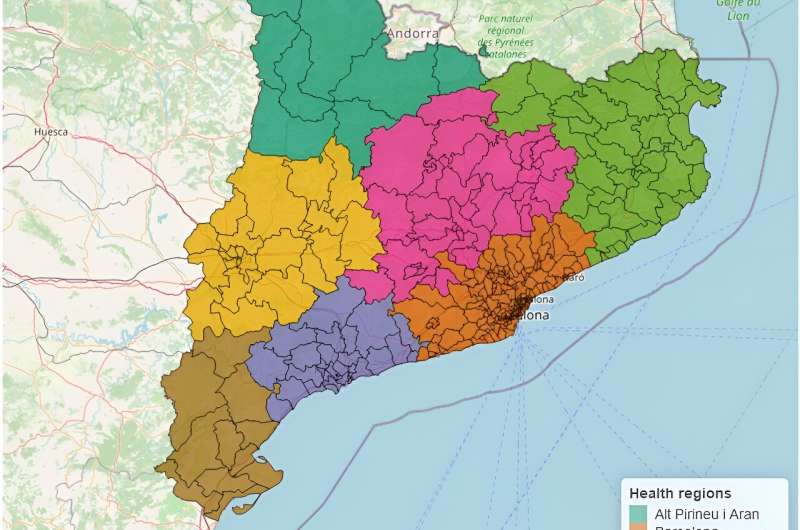This article has been reviewed according to Science X's editorial process and policies. Editors have highlighted the following attributes while ensuring the content's credibility:
fact-checked
peer-reviewed publication
proofread
A boost to biomedical research with statistical tools: From COVID-19 analysis to data management

The Biostatistics Unit, a recent addition to the technologies and services offered by Germans Trias i Pujol Research Institute (IGTP), consists of a team of statisticians and mathematicians who conduct and support biomedical research. They have recently published two notable articles.
The first paper, appearing in Scientific Reports reveals the role of socioeconomic inequalities and vaccination in the spread of the COVID-19 pandemic. The second, published in BMC Medical Research Methodology, introduces REDCapDM, a new R package designed to enhance efficiency and reliability in the management of research data collected through the popular REDCap platform.
Impact of COVID-19 in Catalonia: Socioeconomic inequality and vaccination
The first study, published in Scientific Reports by researchers Pau Satorra and Cristian Tebé, sheds light on the evolution and consequences of the COVID-19 pandemic in Catalonia. Using spatio-temporal Bayesian models, the analysis reveals how the incidence of the virus and hospitalizations varied among different basic health areas (ABS) over time, highlighting key factors that may have influenced these trends.
The findings indicate that urban areas experienced a higher incidence of cases and hospitalizations compared to rural areas, suggesting an association with population density and living conditions in these areas. This underscores the need for specific public health strategies in densely populated urban environments.
The study also points out the impact of socioeconomic inequality on the effects of the pandemic. ABS with higher levels of socioeconomic deprivation have suffered higher hospitalization rates, highlighting how socioeconomic conditions can exacerbate the effects of a global health crisis.
One of the most significant findings is the protective effect at the ABS level of complete vaccination against the virus, demonstrating the vital importance of vaccination campaigns in combating the pandemic.
Full vaccination coverage has been shown to significantly reduce the risk of cases and hospitalizations, reaffirming the public health message about vaccination as a key tool for controlling the spread and impact of the virus.
For this research, open data provided by the Generalitat de Catalunya was used, underlining the importance of access to reliable and transparent information for advancing epidemiological research. The discoveries of this study not only contribute to a better understanding of COVID-19 dynamics at the local level but also highlight the critical importance of vaccination intervention and attention to socioeconomic inequalities as key components in an effective response to the pandemic.
"The use of Bayesian hierarchical modeling was very useful in describing the spatial, temporal, and spatio-temporal trends of the COVID-19 epidemic in Catalonia," says Pau Satorra, the first author of the article.
"We showed that urban basic health areas had a higher risk of COVID-19 cases and hospitalizations compared to rural areas, while socioeconomic deprivation of the area was a risk factor for hospitalizations. Additionally, it was demonstrated that complete vaccination coverage of the basic health area also had a protective effect on the risk of COVID cases and hospitalizations per area."
REDCapDM: An R package for data management in REDCap projects
In this second article, led by João Carmezim and Pau Satorra, IGTP's Biostatistics Unit developed REDCapDM, a new R package aimed at facilitating data management for REDCap projects, a web application for creating and managing databases and online surveys. REDCap is widely used in clinical research for its flexibility and security features.
However, managing REDCap data through R can be complex, often requiring programming work to maximize its efficiency. The REDCapDM package responds to this need, providing specific functions for importing, transforming, identifying discrepancies, and managing data.
Using REDCapDM, researchers can optimize the clinical data management process while ensuring the quality and reliability of the information analyzed. This tool is of particular interest to data scientists and clinical data managers working with REDCap and R, offering a comprehensive solution for research data management tasks.
The implementation of REDCapDM in R, version 4.3.0, and its availability through the Comprehensive R Archive Network (CRAN) opens new doors for efficient data management in clinical studies. This package not only simplifies the import and processing of data from REDCap to R but also enhances the data validation process, which is essential for generating quality data in research.
The development of REDCapDM marks a step forward in automating and improving data management in clinical research, providing researchers with robust tools for data analysis and validation. With ongoing support from the R community and integration with other packages and tools, REDCapDM is set to become a valuable resource for the global clinical research community.
The implementation of REDCapDM in R version 4.3.0 and its availability through CRAN and Github ensures open access to this tool and transparency, which are essential for the progress of scientific research. This project, available for all operating systems and under the GNU General Public License Version 2, demonstrates the positive impact of open collaboration and the use of open-source technologies in advancing medical research.
What is an R Package?
An R package is a collection of functions, data, and documentation developed to extend the functionalities of the R statistical software. Packages allow users to add new analysis techniques, statistical methods, graphics, data import and export capabilities, and more to their R working environment.
These packages are created by the R user and researcher community with the goal of sharing solutions and facilitating work on specific projects or in particular research areas.
More information: Pau Satorra et al, Bayesian spatio-temporal analysis of the COVID-19 pandemic in Catalonia, Scientific Reports (2024). DOI: 10.1038/s41598-024-53527-w
João Carmezim et al, REDCapDM: An R package with a set of data management tools for a REDCap project, BMC Medical Research Methodology (2024). DOI: 10.1186/s12874-024-02178-6




















